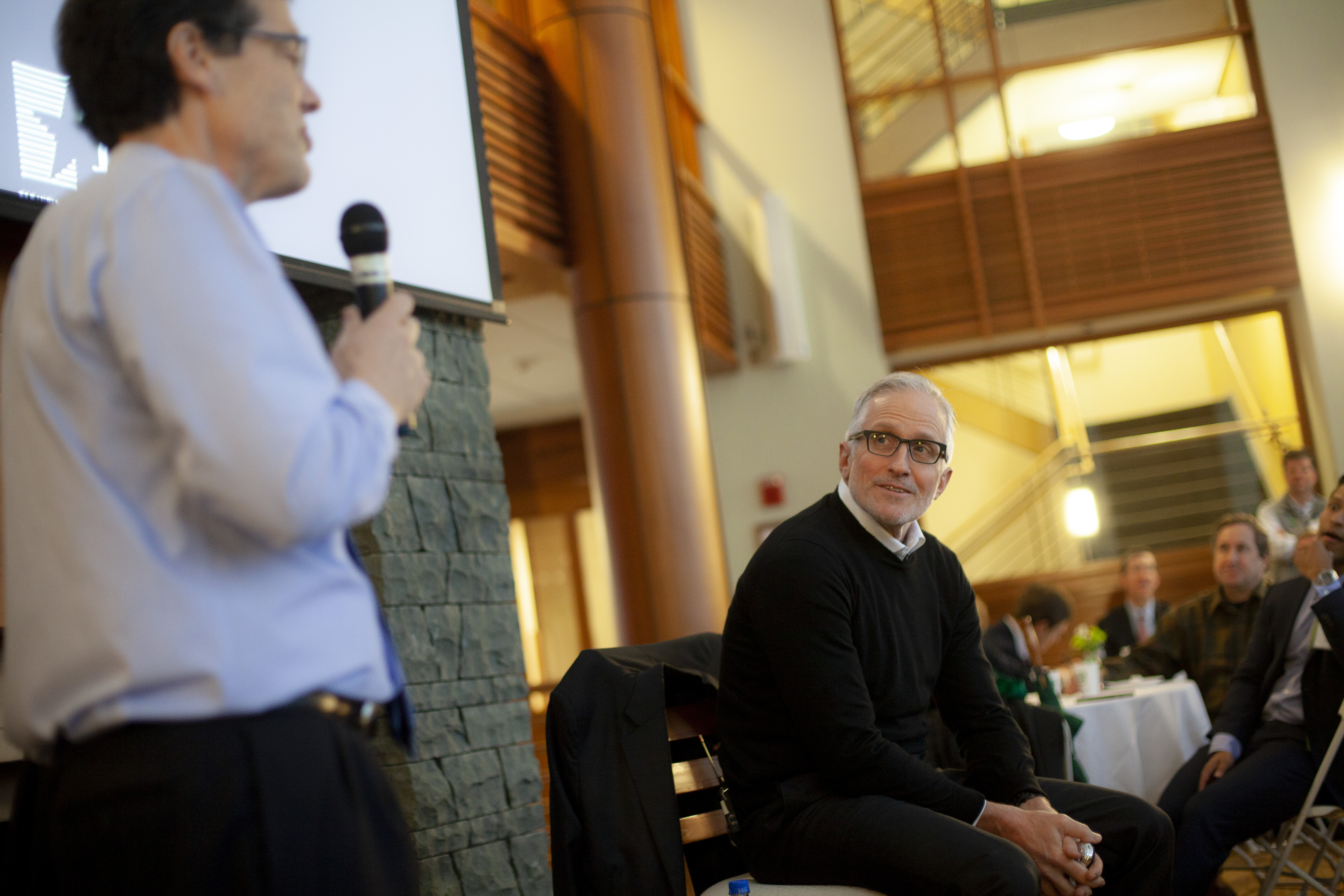
The 14th annual Tuck Private Equity Conference took place February 7-8, 2019 and attracted over 250 registered attendees including industry professionals, Tuck students, faculty, and staff.
In a fireside chat on Thursday evening attended by PE Conference sponsors, panelists, and conference organizers, Kate Mitchell, co-founder of Scale Venture Partners, spoke about exciting new areas of investment in venture capital and new company formation. She noted in particular the potential impact of AI and Machine Learning in a variety of industries, ongoing opportunities in cyber security and enterprise software, and the increasing impact of technology on more and more industries creating venture capital opportunities in industries previously outside the scope of start-up investing. Kate also spoke about policy issues and legislative priorities for the venture capital industry, including increasing H1B immigration and fending off assaults on capital gains taxation of carried interest.
On Friday morning Jim Coulter, co-CEO and founder of TPG Capital kicked off the conference with a dynamic keynote speech. He offered thoughts on private equity subjects from target industries to hot topics and let the audience interactively choose what path his presentation would take—think ‘Bandersnatch’ for finance geeks. Jim prides himself on developing a different view on opportunities, believing it is the only way to differentiate yourself and that volatility can be a gift to long-term investors.
In the afternoon fireside chat before the final panels of the day, Alice Ruth, the Chief Investment Officer of the Dartmouth Endowment, spoke about career paths emanating from sell-side or buy-side investment research. Alice’s own career path went from sell-side investment research in the first half to roles as the founding CIO at both the Gordon & Betty Moore Foundation and Willett Advisors, the family office of Michael Bloomberg, and then to the Dartmouth endowment in the second half of her career. She also spoke about materially lowered long term alpha generation expectations from the public markets leading to continuing increases in commitments to private equity even in the face of massive increases in private equity commitments in recent years.

Attendees chose to attend up to three of six sessions of topical panels throughout the day. Although there was some hesitation around investment in the current environment, industry experts were keen to share their thoughts on how to navigate private equity investing in these interesting times.
Here are the highlights from the six panels covering a wide range of topics including winning deals with industry expertise, PE add-on investments, technology and growth, energy private equity, operational improvements and the market environment for limited partners:
Firepower that translates to competition for deals
Private equity had a record year in 2018—3,000 deals completed globally totalling $582 billion, capping a history-busting five-year run for the industry. This, however, came at a cost as average EBITDA multiples swelled to an average of 11.6x and the availability of debt has allowed this to be levered to 6.0x EBITDA on aggregate.
Firms are well aware of this, and in realizing that good times can only last so long, they have taken to proprietary sourcing techniques to avoid paying such high prices. One investor stated the importance of partnering with target companies early on and leveraging the relationship, because if this starts at the same time as an auction process, you are very far behind indeed.
Others believe the optimum strategy to be partnering with the firm that wins an auction process: de-risking their investment, boosting their IRR, and adding a skilled partner. In these competitive times, it is more important than ever that an investment partner has a solid track record along with other qualitative strengths. Also, a buy-and-build approach is a popular way to grow a company by targeting smaller companies receiving less scrutiny and building scale at lower earnings multiples. However, panelists cautioned that scale for the sake of scale is not good enough—firms must build with purpose and have a clear strategy, as well as having effective integration expertise.
Another firm believes that PE investors must have a well-articulated strategy, whether this is sub-sector focus, thesis-driven, or research-driven. But, this may not always be the case and that one may still have to “shoot doves when doves are flying.”
In the absence of multiple expansion prospects, operational improvements are critical
In a world where there is a risk that earnings multiples may remain steady over the lifetime of an investment—or, dare I say, compress—investors have to think about other ways to squeeze out value from portfolio companies. Some major private equity firms have established operations groups which delve into companies, looking to improve everything from sales and marketing to organizational structure and culture. Others believe that a separate unit is unnecessary, and instead look to identify the internal issues in a company and outsource the improvement of such to third party specialists in a ‘center-led approach’.
Either way, all panelists agreed that operational improvement is an increasingly important factor in driving returns and cannot be ignored in this increasingly competitive industry. They continued to promote this field as a dynamic and rewarding career path for students, advising that in order to be effective, candidates should gain deep industry expertise in something that is fundamental to creating value before joining an operations group.
Even in the face of uncertainty, Limited Partners maintain commitment
Despite the nervousness surrounding market frothiness and inflated earnings multiples, the Tuck PE Conference’s Limited Partner panelists remained resolute in their commitment to allocations to the private equity asset class. The primary reason being that investment in illiquid alternatives is inherently a long-term play, therefore investors should not be unsteadied by market swings—positive or negative.
One veteran mentioned that the anxiousness over excess dry powder has been expressed since 1983. However, there are still far greater amounts of capital chasing public versus private opportunities. The point was reinforced when they quipped, “Predicting cycles in the public market is a fool’s game, it’s even worse in private markets!” Although the premium returns produced from private equity allocations seem to have been compressed over time, this is in line with historical patterns that the premium narrows in a bull market, before widening again in a bear market.

Furthermore, all Limited Partners believe there is still a lot to be said for manager selection. Top quartile General Partners continue to beat the market by significant margins, and it is increasingly important for Limited Partners to gain or sustain capital allocations in these managers. Therefore, we learned that much like they are in deal making, relationships are fundamental to success from a Limited Partner’s perspective as well.
In conclusion, the PE Conference was a great success and attendees enjoyed a day of engaging discussions with the keynote speaker, panelists and fellow guests. I’m intrigued to learn where the industry trends in the coming year. See you all again in 2020!